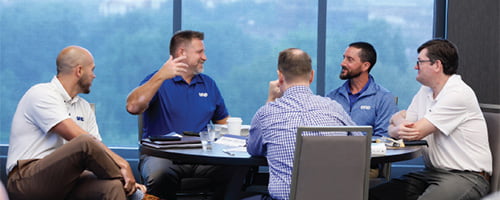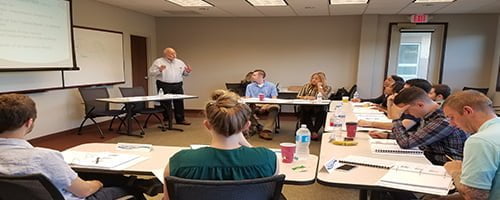
Eminent domain is a powerful tool that shapes the infrastructure we rely on every day – from highways and utilities to schools and public parks. But what happens when the government needs your property for a public project?

Explore ORC’s 12 Step Framework for the renewable project lifecycle.

Explore answers to frequently asked right of way (ROW) questions, from timelines and processes to challenges and best practices for engineering projects.

Discover the major updates to 49 CFR Part 24, enhancing clarity, fairness, and standards for relocation and property acquisition.

Right of Way (ROW) acquisition is a pivotal element in the framework of modern infrastructure projects and land management. This guide, presented by ORC, an industry leader in ROW services, aims to demystify the complex process of acquiring land or property rights for infrastructure development.

Discover the six scientifically tested principles that influence human behavior in business. Learn how these principles can help you win friends and influence people in your business relationships, brought to you by ORC.

Explore the transformative potential of AI in the Right of Way industry, revealing its far-reaching benefits and inherent challenges. Delve into the future of ROW with our thoughtful insights.

An agency is displacing week-to-week tenants from a motel. One of the tenants has been there for over ten years but pays weekly. Several others have been there for more than 90 days. The occupant interviews have not been conducted yet, but the occupants will be asked about permanent residency. Are there any concerns or issues that should be raised in these situations?

Topic: This article will discuss an agency’s regulatory obligation to increase the size of a replacement dwelling or to make modifications to accommodate the displaced person based on anticipated future needs.

For a project, the federal funding agency expects the agency to receive the federal funds (the grantee or project sponsor) to comply with all applicable UA requirements. In addition to the UA requirements, some federal agencies have adopted guidance or policy to specify approval thresholds for actions like high-value appraisals, settlements, and the implementation of condemnation.

This article will describe the changes made to the Actual Direct Loss of Tangible Personal Property provisions in §24.301(g)(14)(i) and (ii)

This article will discuss when search costs can be incurred and if they can ever exceed $2,500.

This article will discuss the types and limitations of reimbursement for code-related modifications incurred by a business required to move.

This article will generally discuss actual move costs that are reimbursable.

This article will discuss whether a student who occupies private housing or a dormitory is eligible for a replacement housing payment. The article will also address the computation of the payment if the student is eligible.

When the agency cannot locate a comparable replacement dwelling that contains a major exterior attribute that is present in the displacement dwelling, like the swimming pool mentioned in the rule, an adjustment must be made in the computation of the price differential payment. The idea is that since the replacement dwelling will be lacking this attribute, the owner must be compensated in some manner for the loss.

Since the Uniform Act (UA) is a law, it is not possible for an Agency to not follow, or deviate from, its provisions. Some Agencies may not seek a waiver in the above-described situation, since it may view the similar amount of square footage and larger rooms as a trade-off for the fifth bedroom. [

A comparable replacement dwelling must meet decent, safe and sanitary (DSS) standards, is adequate in size to accommodate the occupants, is in an area that is not subject to adverse conditions, is located in an area that is not less desirable than the subject and is on a site that is typical in size for residential development.

If you own residential real estate, 2021 is a good time to sell. The real estate market across the United States has recently been a “seller’s market,” one that is very favorable to sellers. Usually this means the seller doesn’t need to make concessions to the buyer to facilitate a sale, such as agreeing to pay some or all of the buyer’s closing costs. However, many market areas are experiencing such a high demand that buyers are essentially bidding up the asking price of the house. Because the demand for residential property is high and the housing supply hasn’t kept pace, it isn’t uncommon for a buyer to make an initial offer that is higher than the asking price so the seller will accept.

With so many natural disasters occurring around the country, federal agencies address how these situations should be handled in order to treat persons affected equitably and fairly to replace what was lost or destroyed. Community Development Block Grant-Disaster Recovery (CDBG-DR) funds must be used for “…necessary expenses related to disaster relief, long-term recovery, housing, and economic revitalization…”

What started out as just an idea (over 100 years ago) became the most extraordinary capital construction subway project in New York City (NYC) history, undertaken by the New York Metropolitan Transportation Authority (MTA). ORC was fortunate to be a major participant in the relocation of residential and business tenants required to move for the construction of new subway entrances and ancillary facilities associated with the Second Avenue Subway (SAS) project.

At ORC, one of the fundamentals of “The ORC Way” (the code we ascribe to as an organizational culture) is to “listen generously.” To achieve this, begin by thinking about your own experience as a friend, a stranger, co-worker, or customer – recall the times you truly felt understood and happy to be listened to, or the unfortunate times you were outraged by negligence and felt a relationship instantly distancing due to lack of attention. When we master the skill of listening, we truly learn from those around us. Percussion educator, Mark Perrett, once said, “If you don’t go through life with an open mind, you will find a lot of closed doors.” As a right-of-way agent, these words ring especially true.

At ORC, our advanced Quality Assurance and Quality Control (QA/QC) program is designed to manage all aspects of the right-of-way acquisition process. To this end, we maintain a fully staffed QA/QC team dedicated to maximizing Quality Control. Our QA/QC Team meets with project managers prior to a project’s start to build a customized plan focused on limiting errors and maximizing productivity. Our QA/QC roadmap also gives us the opportunity to grow from each project through improving communication and customer experience while expanding our diverse client base.

During right-of-way property acquisition, mortgages often are overlooked. However, mortgages often present special concerns during right-of-way property acquisition, particularly regarding obtaining partial releases on mortgaged properties. Since most agencies will not purchase property encumbered by a lien, when a partial taking of a property is required, the acquired portion of the property must be released from the mortgage to clear it of any liens or other encumbrances. Not all lenders permit partial releases on properties under mortgage.

We often think of an owner as the person who holds exclusive fee simple title to the property the agency needs to acquire. The federal regulations, however, broadly define the owner of a dwelling to include a person who holds other interests in real property, such as a life estate, a land contract, or a long-term lease. Even a person with a partial ownership interest may qualify as an owner. [See 49 CFR 24.2(a)(20)] How does this definition impact an agency’s relocation program?

Imagine that you are sitting in a relocation course and the instructor asks who can explain the difference between the actual direct loss of tangible personal property payment and substitute personal property payment. Would you be the first person to raise a hand? Or would you think, you may have heard about these payments, but didn’t really understand how they are supposed to work? Maybe they always sounded too complicated to explain to the displaced business.

The following article is from ORC’s internal Knowledge Base, ORC’s proprietary searchable database containing hundreds of technical articles on topics of interest to professionals in the right of way industry. Each article is formatted as a “Topic” and a “Discussion” of that Topic.
The topic of this article is also one of the four subjects in the next course offered through ORC Training’s licensing agreement with IRWA.

The relocation of mobile homes is like assembling a puzzle. Each of the puzzle pieces represents an issue that the acquiring agency must resolve. Each of these pieces must be considered, and then fit into the overall “picture” to achieve a successful relocation.

What happens if a government agency “takes” some property interest from you, but does not compensate you for that loss? For example, what if you own a residential lot and your city or county passes an ordinance that prevents you from building on the property. The day before the ordinance was passed, your lot was valuable and usable as a building site. Today, it is a tract of open space – not developed – and probably worth very little. What recourse do you have?

This article will discuss how the inverse condemnation concept interfaces with Uniform Act (URA) requirements.
Legislative and Regulatory Background
The URA provides added protections for the property owner as well as responsibilities for the acquiring agency in the event of an inverse condemnation situation. Section 4651(8) of 49 U.S.C. of the URA (Title III, Section 301(8) of P.L 91-646) addresses this situation, and specifies that “…no federal agency head shall intentionally make it necessary for an owner to institute legal proceedings to prove the fact of the taking of his real property.” The specific regulation relevant to these protections and responsibilities is found at 49 CFR 24.107.

On August 6th, 1954, The Akron Expressway held a ribbon cutting ceremony to commemorate Akron’s first “super road.” With over 50,000 attending the event, hopeful onlookers witnessed American Progress in Akron, OH. The monumental project was more than nine years in the making and displaced over 500 families. The construction of the highway’s North Expressway Viaduct, a 1,500-foot-long bridge over the Little Cuyahoga Valley, accounted for approximately one-third of the overall $9 million project budget (about $80 million today).

A farm operation is eligible for the fixed payment in lieu of all moving and related expenses including reestablishment expenses. You may encounter a wide variety of farm operations that include growing crops, raising livestock, or harvesting timber. The Uniform Act regulations define a farm operation at 49 CFR 24.2(a) (12): “any activity conducted solely or primarily for the production of one or more agricultural products or commodities, including timber, for sale or home use, and customarily producing such products or commodities in sufficient quantity to be capable of contributing materially t o the operator’s support.”

Distribution Pipelines (low pressure pipelines designed to serve customers along their route) present an array of challenges ranging from their proximity to existing underground and above
ground utilities to how their installation impacts individuals and businesses during construction. In most all cases, space is a commodity and frequently unavailable except outside of existing road rights-of-way.

Working on a pipeline project during the construction phase requires constant vigilance. Employees are surrounded by safety hazards ranging from open ditches and overhead powerline contacts to being aware of the movement of heavy equipment on the line. There are crush hazards, trip hazards, fall hazards and even venomous snake hazards just to name a few. The requirement for personal protective equipment (PPE) and daily safety reminders is not only practical it is lifesaving.

With increases in cyber-attacks, identity theft, and threats to personal information and security around the world, we wish to provide you with information about how ORC is working to safeguard the personal information of our clients, property owners and others who trust us with their personal information.

O. R. Colan Associates was founded by my father, Owen Richard Colan, J.D., in 1969 and this year ORC is celebrating our 50th Anniversary!
A veteran of WWII, he was educated at Georgetown Law School and discovered the right of way business when he was hired to purchase right of way for the original WV Turnpike (now I-77 from Charleston to Bluefield).

At its core, Quality management is a business philosophy that champions the idea that the long-term success of a company comes from customer satisfaction. The discipline of Quality management applies to all internal processes and deliverables produced for the Customer.

If you spend a lot of your time managing right of way acquisition projects, or meeting with property owners to make offers and negotiate settlements, you are focused on acquiring the real property needed for the project. You probably don’t think very much about what happens when a settlement includes real property outside the project limits for construction. Often, this additional acquisition becomes what we call “excess real property.”

While many right of way assignments end with the successful acquisition of the necessary permanent and temporary rights of way; the pipeline right of way agent’s job often continues through construction, restoration and final in-service of the pipeline.

Finding qualified workers in today’s workforce is a critical concern facing employers throughout the nation. Recent surveys and industry experts are touting eminent worker shortages for available jobs. ORC has long recognized that quality employees are an invaluable commodity and that we can play an active role in their development and availability.

Have you ever attended an initial walk-through for a business relocation and felt like you were watching an episode of How It’s Made? Well, typically, when you begin the relocation process of a manufacturing facility of any scale, this metaphor is reality. That is, you must first understand what the product is and how it is made before you can successfully begin the relocation process.
